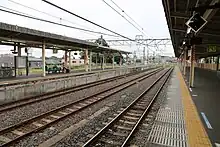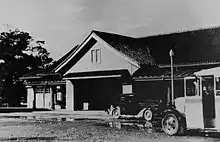Narita Station
Narita Station (成田駅, Narita-eki) is a passenger railway station in the city of Narita, Chiba, operated by the East Japan Railway Company (JR East).
JO35 Narita Station 成田駅 | |||||||||||||||||||||||||
|---|---|---|---|---|---|---|---|---|---|---|---|---|---|---|---|---|---|---|---|---|---|---|---|---|---|
 The station entrance in May 2016 | |||||||||||||||||||||||||
| General information | |||||||||||||||||||||||||
| Location | 839 Hanazakichō, Narita-shi, Chiba-ken Japan | ||||||||||||||||||||||||
| Coordinates | 35.7778492°N 140.3140837°E | ||||||||||||||||||||||||
| Operated by | |||||||||||||||||||||||||
| Line(s) | ■ Narita Line | ||||||||||||||||||||||||
| Platforms | 1 side platform + 2 island platforms | ||||||||||||||||||||||||
| Tracks | 6 | ||||||||||||||||||||||||
| Connections | KS40 Keisei Narita Station | ||||||||||||||||||||||||
| Construction | |||||||||||||||||||||||||
| Structure type | 13.1 from Sakura | ||||||||||||||||||||||||
| Other information | |||||||||||||||||||||||||
| Status | Staffed (Midori no Madoguchi) | ||||||||||||||||||||||||
| Station code | JO35 | ||||||||||||||||||||||||
| Website | Official website | ||||||||||||||||||||||||
| History | |||||||||||||||||||||||||
| Opened | 19 January 1897 | ||||||||||||||||||||||||
| Passengers | |||||||||||||||||||||||||
| FY2019 | 16,103 | ||||||||||||||||||||||||
| Services | |||||||||||||||||||||||||
| |||||||||||||||||||||||||
| Location | |||||||||||||||||||||||||
 Narita Station Location within Chiba Prefecture  Narita Station Narita Station (Japan) | |||||||||||||||||||||||||

Lines
Narita Station is served by the Narita Line, and is located 13.1 kilometers from the terminus of line at Sakura Station and 68.5 kilometers from Tokyo Station.
Station layout

Narita Station has a single side platform and two island platforms, connected to the station building though footbridges to a common concourse. Track 4 is not served by a platform, and is used by non-stop Narita Express and Ayame limited express services. The station has a Midori no Madoguchi staffed ticket office.
Platforms
| 1 | ■ Narita Line | for Chiba and Tokyo (via JO Sōbu Line (Rapid)) |
| some trains for Narita Airport | ||
| 2 | ■ Narita Line | for Chiba and Tokyo (via JO Sōbu Line (Rapid)) |
| some trains for Chōshi | ||
| 3 | ■ Narita Line | for Narita Airport and Kashimajingū |
| some trains for Chiba and Tokyo (via JO Sōbu Line (Rapid)) | ||
| 5 | ■ Narita Line | for Chōshi, Kashimajingū and Narita Airport |
| some trains for Chiba and Tokyo (via JO Sōbu Line (Rapid)) | ||
| some trains for Abiko, Ueno, Tokyo and Shinagawa (via JJ Jōban Line (Rapid) and Ueno–Tokyo Line) | ||
| 6 | ■ Narita Line (Abiko Branch Line) | for Abiko, Ueno, Tokyo and Shinagawa (via JJ Jōban Line (Rapid) and Ueno–Tokyo Line) |
History

Narita Station opened on 19 January 1897[1] as a terminal station on the Narita Railway Company for both freight and passenger operations. The line was extended to Ajiki in 1902. The Chiba Prefectural Tako Line began operations on 1 July 1911, connecting Narita with Tako, Chiba. The Narita Railway was nationalised on 1 September 1920, becoming part of the Japanese Government Railway (JGR), and on 1 April 1927, the Chiba Prefectural Tako Line was renamed the Narita Railway Company Tako Line. This line stopped operations on 11 January 1944 due to wartime conditions, and was officially abolished in 1946. After World War II, the JGR became the Japan National Railways (JNR). The station building was reconstructed from 1977–1979. The station was absorbed into the JR East network upon the privatization of the Japanese National Railways (JNR) on 1 April 1987. The spur line to Narita Airport was completed on 19 March 1991.
Passenger statistics
In fiscal 2019, the station was used by an average of 16,103 passengers daily (boarding passengers only).[2]
Surrounding area
- Keisei-Narita Station
- Narita City Hall
- Shimofusa Post Office
See also
References
- "JR East Narita Station information" (in Japanese). East Japan Railway Company. Retrieved 3 December 2010.
- 各駅の乗車人員 (2019年度) [Station passenger figures (Fiscal 2019)] (in Japanese). Japan: East Japan Railway Company. 2020. Retrieved 11 August 2020.
External links
![]() Media related to Narita Station at Wikimedia Commons
Media related to Narita Station at Wikimedia Commons
- JR East station information (in Japanese)